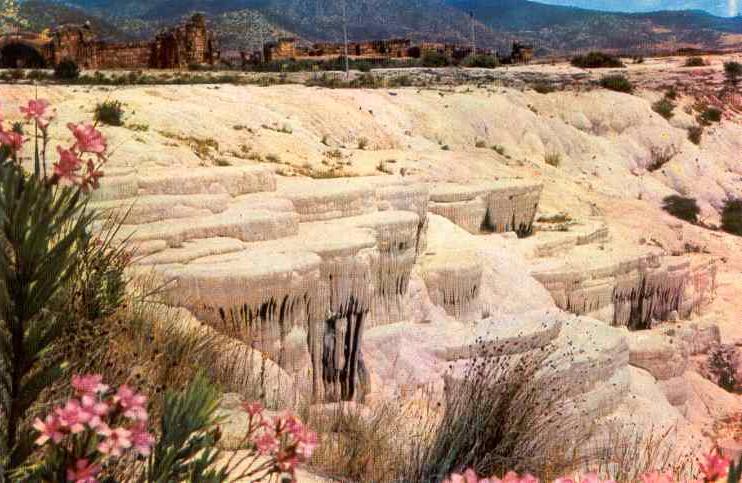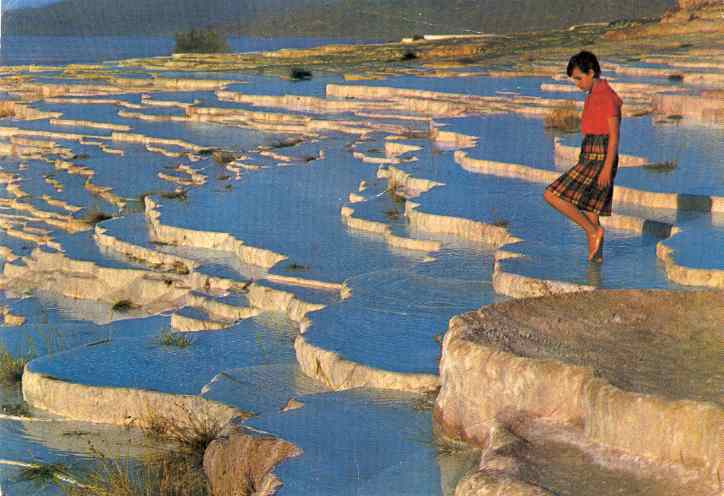|
|
|
|
|
|
|
|
|
|
|
|
|
|
|
|
PAMUKKALE
|
Combine some of the wonders of man with Mother Natures most amazing feats... Venture inland through truly beautiful Turkish scenery to the magnificent Pamukkale, the site of a wonderful natural phenomenon, totally unique in the world. Firstly a visit to the ancient city of Hierapolis, an open air museum where we pass through an ancient graveyard containing over 1200 Sarcophagi, many the size of small houses. The vast Roman and early Christian cemetery is one of the best preserved and most fascinating in Turkey. Then onwards towards Pamukkale (cotton Castle in English ) which is a shimmering cascade, formed by limestone laden hot springs, which have formed stalactites some 100 metres high, potholes and magical fairy tables. The water is reputed to be beneficial to the eyes and skin and alleviate the ills of rheumatism, asthma and dermatitis. We've all seen the pictures, we've all seen the ads. Let's make it reality... A must for every holiday maker...
|
 |
Pamukkale is an
extraordinary natural wonder. The mineral-rich waters rise from the ground
at a temperature of 35°C and tumble down the mountain from a height of 100
metres, forming a myriad of pools. Cream colored stalactites are formed as
the water overflows the pools, creating a breathtaking sight unequalled in
the world. Water is the sole instrument in the creation of this gleaming
fairy castle that resembles cotton (hence the name "Cotton Castle"). There
are an abundance of hot springs in this wonderland which are recommended for
the treatment of heart disease, circulatory problems, high blood pressure,
nervous disorders, rheumatism, eye and skin diseases, nervous and physical
exhaustion, and digestive maladies.
|
 |
The road to Pamukkale (19
km from Denizli) is lined with oleander bushes which anticipate the relaxing
atmosphere of this ideal holiday center. The hotel pools are in garden like
settings; the natural ones on the hillside, with their tiny splashing
waterfalls, are particularly appreciated by nature lovers and sunbathers.
The ruins of Hierapolis are the other main attraction. The city was founded
in 190 B.C. by Eumenes II, king of Pergamon. In the 2nd and 3rd centuries
A.D. it reached the height of its development as a Roman thermal bath
center. Hierapolis has such extensive ruins that the following route is
suggested: After admiring the city walls, start with the 5th - century
octagonal Martyrium of St. Philip, cross to the 2nd- century
theater for some fine marble reliefs above the stage, all quite
well-preserved.
Next to the Temple to Apollo is a sacred area a deep hole in the ground
(known as Plutonium) that used to emit noxious fumes (carbon dioxide)
which the priests said were fatal to all except themselves. A memorial fountain is nearby.
|
|
Pamukkale - £35 per
person
Itinerary
The price includes transfer to/from the apartment, travel, tour guide, insurance, entrance to Pamukkale and 1 night half board in a 3 star hotel. Lunch and drinks are not included.
|